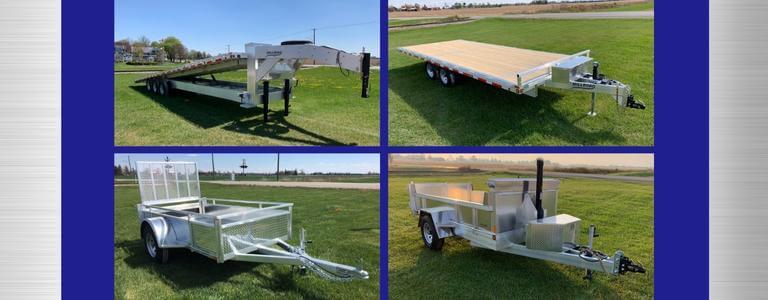
October 10, 2022 Last updated on June 16, 2023 by Bob Fisher Bob Fisher Custom Trailer
You may feel equipped for a heavy-duty job if you already have a truck or SUV. However, you need to understand four crucial factors before hitching up to a trailer— the loads you’ll carry, types of custom trailers, your hitch system, and your towing vehicle capacity.
Without expert guidance in selecting your trailer, you could cause expensive damage to your vehicle and cargo. Millroad Manufacturing works with a network of partners around Ontario to provide the perfect transportation equipment to haul your gear confidently.
The items you’ll tow are crucial in deciding which trailer you need. Are you bringing horses or motorcycles to a show? Are you carrying equipment to a job site or pulling another vehicle? Determine the size of your load by weight and dimension. Trailer specs are measured using the imperial system, so calculate weight in pounds. Figure your required deck length and width in feet and inches.
Always err on the side of caution by overestimating the measurements. For example, suppose you’re bringing horses to an exhibition. You’ll need space for daily care items, feed, water, bedding, riding gear, first aid, and emergency equipment for the truck and trailer. If you only have the capacity for the animals, you’ll be in a tight spot.
Millroad Manufacturing crafts sturdy trailers for every conceivable purpose. The following options meet the varying size requirements for work or play:
Your truck’s payload capacity is the maximum weight of passengers and cargo you can safely carry. The figure is expressed in your vehicle’s Gross Vehicle Weight Rating (GVWR). For example, a 4,500-pound truck with a GVWR of 7,000 pounds can bear an additional 2,500 pounds.
The payload capacity in GVWR includes the tongue weight, which is the force exerted where the vehicle and trailer are connected. Tongue weight is roughly 10% of the total trailer weight when full, so a trailer with a gross weight of 5,000 pounds would add 500 pounds to your vehicle’s payload.
Gross Combined Vehicle Weight Rating (GCVWR) allows you to determine how much weight a vehicle can pull. Suppose a truck has a GCVWR of 22,000 pounds and a curb weight of 7,000 pounds. If the vehicle is carrying 2,000 pounds of payload, the towing capacity is 13,000 pounds.
Use these calculations to decide if you need a different truck for your required load.
A weight distribution hitch must be suited for your trailer’s tongue weight. A hitch that is too heavy makes for a bouncy trailer and rigid ride, but one that is too light can’t do the job and is dangerous. Determine the tongue weight of your trailer when fully loaded. If you use the unloaded weight on the trailer spec sheet, you’ll come up woefully short.
You can find and design the perfect trailer with Millroad Manufacturing. Check out our website to view your options for custom trailers at a dealer near you in Ontario.